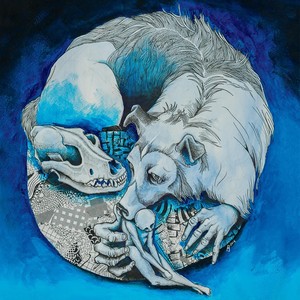
- 歌曲
- 时长
简介
“When I was twenty-three,” Tyler Daniel Bean writes of On Days Soon To Pass, “I decided to live.” These words begin the scholarly personal narrative accompanying his master’s capstone project—his second LP and a chapbook of poems, both of which aimed at discovering a language of process that leads toward preservation instead of annihilation. He determined through a hands-on study of poetry and music as therapy, and an extensive examination of literature, criticism, and philosophy, not only what preservative writing looks like, but also how to reorient creative work to better engage with and project hope, suggesting that rowing toward personhood is a never-ending cycle of progress and choice, and that self-renewal, for those dealing with mental health disorders, is the recurring epiphany of learning how to interact with the world. On Days Soon To Pass is, as Rick Mastelli writes in the foreword to the album, “an intense excursion into an unlikely topic.” For while on the surface, the record confronts depression, loss, anxiety, and fear as often as it does love and happiness, it is ultimately a battle between suicide and continuance. On Days Soon To Pass presents a non-linear depiction of the days Tyler feared would present an end rather than a beginning (“Archibald Street” presents a beginning, and “All At Once” another beginning, but the series of events in between are kaleidoscopic in their presentation, even shifting time from section to section of the songs). Yet, here he is on the other side of most of them, all the better for having expressed what had once been ineffable. The fear Tyler felt was inexplicable when he first noticed that these songs were presenting as suicide songs. It was 2012, just after the release of his first LP Longing, and it was so concerning that he stopped writing entirely. More than a year passed between penning the first collection of songs for ODSTP before beginning his master’s degree. It took another year for him to start writing creatively again—he was inspired by a conversation with Mastelli about his upcoming capstone project. The two talked about the relationship between fear and art (that they feed off one another), as well as the necessity to finish what had been started, and Maselli quoted filmmaker Stan Brakhage: “The object of fear must be objectified.” Tyler spent the following year bringing light to what he feared most: loss—the death of his dog, Willow; the death of his close friend and band-mate, Chris Parmelee; one of his own near-death experiences (the one that caused him to want to live). Yet penetrating all of this, he found Love. It begins with questions similar to if you know me, will you still love me? And it ends with the realization that the you he constantly refers to had known all along, standing beside him both when he writhed and when he blossomed. To understand this record is to look at its sullen, dense surface matter, and see beyond it to the steady beacon that is Love; it is to see that staring into the face of fear is to strive to be fully human; it is to find a way to truly say I want to live, even when mental illness still presents an endless battle. For as Mastelli writes at the end of his foreword: “Depression calls out from its shadows, voices its fears and its failings, tries to make something of nostalgia, listens for a response. Dark notes and woeful concerns coexist with something like hope, while the music builds from the bottom up: Tyler’s bass or Joe Cross’s drums essaying forth, sometimes at odds, sometimes pressing forward resolutely; Tyler’s and Kevin Yando’s guitars reinforcing, challenging, or couching the words, often trading measures across the channels; Shannon Stott-Rigsbee’s violin probing, echoing; Nyiko Beguin’s synth, evolving from delicate to fervid; and Tyler’s and Jess McDermott’s voices calling out and back from their different points of view. Listen.” Tyler Daniel Bean’s On Days Soon To Pass is coming out on November 18th on Skeletal Lightning and Tor Johnson Records. It was recorded and mixed by Ryan Stack at Format Audio in Amesbury, Massachusetts, and it was mastered by Dan Coutant at Sun Room Audio in Cornwall, New York. William Schaff (Godspeed You! Black Emperor, Songs:Ohia, Brown Bird, Okkervil River) painted the cover with minimal outside direction, specifically from his experiences listening to the album.







